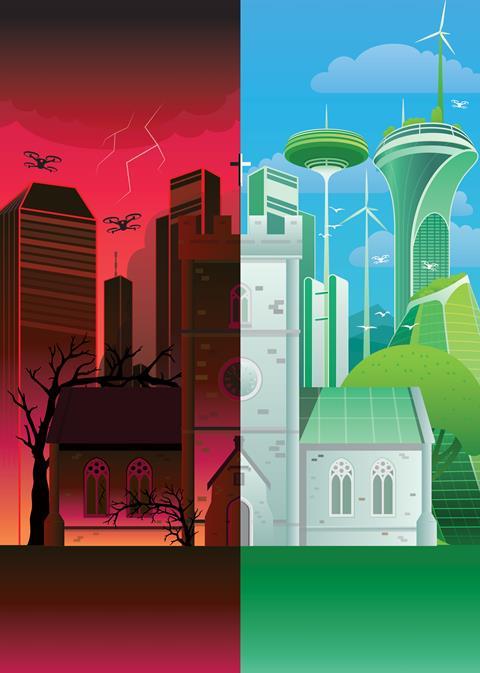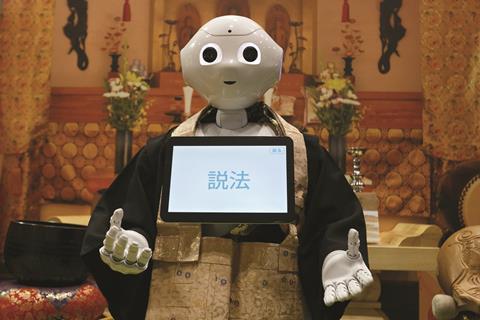Chat GPT hasn’t even celebrated its third birthday, yet this powerful technology is already rewriting the rules of work, creativity and even worship. Sam Hailes convenes a panel of experts to consider what the rapid rise of AI means for the future of the Church

You and I could be living through the most transformational technological change in 1,000 years. The only problem is, no one seems sure whether Artificial Intelligence (AI) will enhance our lives…or lead to the obliteration of everything we hold dear.
Perhaps we’re on our way toward blissful utopia, where menial jobs are confined to the history books and we all live on a Universal Basic Income. A world where AI predicts and helps treat disease in record time and technology unlocks a world of abundance.
Or maybe a terrifying dystopia is around the corner, where a superintelligent AI turns against humankind, takes control of every data centre on earth and nuclear Armageddon follows.
Of course, the truth is unlikely to be found on either extreme. Nevertheless, AI is a contested – and often confusing – area. That’s why I’ve asked four Christians with expertise in tech to offer some much-needed wisdom into this space. Millions of Christians are already using Large Language Models (LLM) such as ChatGPT, Google’s Gemini and Anthropic’s Claude to craft Bible studies, inform their theology, handle basic administrative tasks and even write prayers and worship songs. As anyone who has used these free tools will know, they’re incredibly good at such tasks, and are only getting better.
But just because an AI model can do something, that doesn’t mean it should. In our discussion we covered ethics and eschatology. We considered whether AI should write sermons, if robot vicars are just around the corner and whether or not technology is making us all just a little bit dumber…

How should Christians and church leaders be using AI?
Chris Goswami: I had a difficult sermon to give yesterday on Hebrews 3 and 4. I wrote it myself, which I always do. I wouldn’t use AI to write a sermon, but afterwards, I put the sermon through AI and asked for some group discussion questions based on life application. That’s where it can be really useful.
A few months ago, a leader in our church asked AI to write the intercessory prayers which, for me, raised an alarm bell. It’s not so much about whether or not you should use AI for that, it’s more that we’d not had that discussion as a leadership team. My concern is that AI is becoming default. It’s being silently adopted more and more, without thinking.
James Poulter: These technologies are really good at writing, and they’re also really good at doing administrative tasks. They’re fantastic for research, collating ideas, being a critical friend or thought partner, because they are trained on vast swathes of the world’s knowledge.
There’s a lot of administration in ministry, and I think that’s where there is a huge opportunity for AI to take a burden off many leaders. There’s also the potential to scale. We’ve seen dwindling numbers of people engaged in things like discipleship and evangelism. AI can help us do that work, and I don’t think we should shy away from that.
Chris: There are some risks to using AI. The first is that AI gets things wrong, sometimes in very subtle ways and sometimes in big ways. Number two, I think it’s pretty much proven now, the more we use AI, the more there is a loss in our ability to think critically. Someone has said it’s a race to the bottom of the brainstem. It’s a temptation. It’s addictive. We can easily lose our ability to process cognitively. And that’s happening now.
There’s a third area of risk for Christians, which is: at what point do we exclude God from this? Is it OK for AI to write my liturgy or worship song if I’ve given it an appropriate prompt?

Do we foresee a time where I might walk into a church, and a robot vicar offers me communion?
Dr Anna Puzio: It’s technically possible, but not in the near future, because churches are among the institutions that evolve slowest. They’re always 100 years behind. So, I don’t think that we will have high technology in churches in the near future.
There’s a lot of administration in ministry, and there is a huge opportunity for AI to take a burden off leaders
There are a lot of robots used for religious practices. In Japan, there’s a famous social robot called Pepper which has been used to conduct funerals.
Heinz Oldewage: I think people want to be led in the sacraments by someone who shares their humanity and who they look at as a spiritual leader.
Perhaps a more interesting question is not whether you’d be comfortable with a robot vicar, but what if the vicar had a neural implant, and used it to deliver his sermons? I think people would instinctively say: “No, absolutely not.” But there isn’t much of a difference between knowledge that’s delivered to your brain by an external interface like a screen, versus knowledge that’s delivered to your brain through electrical impulses in an implant.
James: You’re so right, because the reality is that by the time we are at the point where AI can be embodied in something that looks like a robot, that robot will fully look, talk and sound like a human being. We are probably about 20 years away from that – which will feel like the blink of an eye.
I had a conversation with a large teaching ministry in the US this week. They were talking about an individual in their 80s whose name you would recognise. They want to ask him if he’d be comfortable with all his content – which has been broadcast on radio, TV and written in sermons – being digitised, so an AI version of him could be created for future usage. A chatbot version of this person could be created to deliver their content and thoughts like it’s an active conversation.
After Spurgeon’s College closed earlier this year, I asked ChatGPT what the real CH Spurgeon might have thought about it. It gave a very plausible answer in his voice. In the future might we pay to attend an event where we watch a synthetic version of our favourite dead preacher ‘talk’ on a new subject?
Anna: There’s already a booming grief bot industry, where there are AI-enabled digital representations of the deceased.
The fear of death and mourning was always the domain of religions, and it’s now being taken over by companies. So yes, it’s very likely that posthumous avatars will be in our lives in the near future.
AI is not a super-intelligent power or an all-knowing entity, but an industry consisting of humans. It’s a network
Chris: I think as long as it’s just entertainment that might be OK. But it reminds me of the Florida floods last year, when images circulated of Donald Trump saving children. A very senior person in the Republican Party was challenged, and someone said: “You know these are fake, don’t you? These are AI images.” And she said: “That’s not the point. It doesn’t matter that they’re fake, because this is what Donald Trump would have done if he was in that situation.”
If we’re bothered about truth, and if we believe Jesus is the truth, then we have to say: “Hang on!” We’re slipping into something worrying.
Chris, why wouldn’t you use AI to write a sermon?
Chris: There’s something both human and Christian about struggling with the text to produce something. It’s in our wrestling that we are being formed, and God meets us in the struggle.
Heinz: When you’re a preacher standing in front of a congregation, it’s not the information that transforms. It’s revelation. And that revelation is carried through your personality, conviction and obedience. If you’re essentially copying from AI, you are outsourcing your wrestle with the text. And that wrestle is where the transformation happens.
James: If Chris is planning his sermon late on a Sunday morning, and he hasn’t done a great job, then what would the congregation rather? That Chris asks AI to write the sermon last minute, or that Chris stands in front of them and says: “Guys, I didn’t come well prepared enough, but I’m just going to wait for the Holy Spirit to help me get through this regardless, and we’ll see what happens”? There’s a choice in that moment.
We may not want to use ChatGPT to write a sermon – but it could. Similarly, how concerned should I be that my job as a journalist may not exist in a few years’ time? Could AI replace me – or the church administrator who is made redundant because the AI systems are so good?
James: The reality is we’re already seeing some jobs disappear. It’s becoming uneconomically viable to pay somebody when AI can be a better researcher, copywriter, compiler of facts and information, or do data entry.
We shouldn’t be concerned about individual jobs. Individual jobs will go through a reinvention, but work is being reinvented in a much more macro sense at the moment. In Nick Bostrom’s new book, Deep Utopia (IdeaPress), he highlights how a lot of our hobbies were once jobs. Horseback riding, making pottery – so maybe some of the things that we do now as jobs may become hobbies in the future.
Just because an AI model can do something doesn’t mean it should
What we really want to guard against is the disappearance of human dignity that work gives us. We have a theology of work – there are two biblical examples where we are given things to do, in the Garden of Eden in Genesis and in the great commission in Matthew. We believe that we’re not just here to be ambient pleasure zombies that get to sit around and wait for the world to deliver us into utopia. We have to toil and labour – and the minute that begins to disappear, I worry about what we’ll lose. We don’t want the next generation to feel lost. As Jordan Peterson has said many times: “One of the most dangerous things in the world is a young man without a sense of purpose.”
Chris: There was a cartoon in a newspaper over a year ago by Matt which showed two little boys sitting on a garden gate, and one boy said to the other: “When you grow up, what job do you want AI to do for you?”
The jobs which are potentially at risk tend to be the educated ones which you need a degree for. But AI isn’t going to replace hairdressers, plumbers, construction workers and electricians, which is a nice inversion of how the world has been. Maybe there’s something biblical about the last being first.
Anna: There are parts of our jobs that are not good for our wellbeing, whether it’s poor posture at a desk, too many emails, heavy lifting on construction sites. I think we have to decide what parts of our jobs we want to replace – and whether there are jobs that no one wants to do. We should use technology for the things that technology can do best. But we shouldn’t use technology for things that humans can do better. For example, creativity. Social and communication skills are important – to interact with people. We don’t want these things to be replaced.
Let’s talk about where this might be going. People are fearful about the future. Tech billionaires such as Mark Zuckerberg are reportedly building huge underground bunkers. Eliezer Yudkowsky’s new book about “super intelligent AI” is called If Anyone Builds It, Everybody Dies (Bodley Head). Is this just scaremongering, or could AI really herald the end of the world?
James: Eliezer has been what some might call an ‘AI Doomer’ for some time. His idea is that if something is more intelligent than us, we can’t predict what it would do. It’s not dissimilar to the nuclear weapons argument, which is that if we create it, there’s always the potential for someone to use it for bad.
The rationale is that AI could get to the point where it is aware of its own computing and steal its own weights and measures (which is how these models are managed) then copy itself out onto the open internet and begin to scale infinitely until it takes over all data centres on the planet. At that point, lots of things get very scary, very quickly.
We should use technology for the things that technology can do best. But we shouldn’t use technology for things that humans can do better
So, I agree we don’t want a super intelligence that tries to be smarter than humans, because then we’d potentially reach these doom scenarios.
Anna: AI is often associated with the end of time, because AI represents a profound transformation – and how overwhelming that can feel for society.
We don’t know what our future will be. However, Christian eschatology is also meant to provide hope. It describes a community with other people and God, and it offers a sense of security.
Heinz: We’ve seen this movie before. Think about the printing press, radio and nuclear power. It’s always interpreted through an eschatological lens. I don’t think that instinct is wrong. Scripture tells us to be alert to systems that can be used to dominate and manipulate, and AI definitely has a potential for that.
But it would be a mistake to settle into some kind of fear-driven theology. Instead, we need faith-driven discernment, which says there is a way in which some of these things can hasten the day. But let’s not be paralysed by fear. Let’s share the hope of the gospel. Ultimately, I believe that resurrection and new life is the end game. And so that gives me hope, regardless of what happens in the medium term.
James: When CS Lewis was writing about how to live in the atomic age he said: “If we are all going to be destroyed by an atomic bomb, let that bomb, when it comes, find us doing sensible and human things: praying, working, teaching, reading, listening to music, bathing the children, playing tennis, chatting to our friends over a pint and a game of darts – not huddled together like frightened sheep and thinking about bombs.”
Lewis wasn’t telling his reader they shouldn’t be scared because there’s no chance that they’re going to die. He was telling the reader to wrap their beliefs around the fear. And I think that’s what we’re also called to do at this moment.
What’s your takeaway from this conversation?
James: AI might occupy less than one per cent of your thinking on a given week. But we have to wrestle with the fact that in the next decade, this technology is going to be more transformational than almost anything that we have experienced in the last 100 years, maybe even the last 1,000 years.
If this means that we can spread the gospel faster and relieve humanitarian crises, why wouldn’t we want that? At the same time, we don’t want to live in a time where AI takes over the world and dehumanises us. So, take this topic incredibly seriously. Talk about it with your friends. Make sure that you’re talking about it in church and get educated about how this is going to change things.
AI forces us to think really deeply about what it means to be human
Heinz: One of the things I love most about the conversation around AI is that it forces us to think really deeply about what it means to be human. Us being created in the image of God is so incredibly important. It’s only humans who bear the image of God and are capable of joy, relationships, spiritual awareness. We are so much more than just intelligence or processing power. We have unique moral agency, creativity and capacity for communion with God. A machine cannot repent, cannot worship, cannot love. There is a special place for humans in the unfolding plan of God, and we should not lose track of that.
Anna: I think a key message is that AI is not a super-intelligent power or an all-knowing entity, but an industry consisting of humans. It’s a network. It’s influenced by politics, by the economy. So don’t think that AI controls us. We don’t have to be scared of what AI might be in the future, because this is technology that we can shape for the good. As a Christian, I would always ask myself how we can use technology for social purposes. To not keep the focus on output or efficiency, but good.
Chris: At the AI Christian Partnership, we’re working on guidelines, particularly for churches, on how to approach this topic. For example: Use AI to critique what you do. Don’t use it to create what you do. I would say to churches: Don’t let this be something that’s just silently used by some folks. We need transparency. You need to say: “It’s OK to use AI here, but don’t use AI there.” That conversation needs to take place now. Bring it out into the light.
10 ideas on how to use AI
1. Rather than asking ChatGPT to craft a sermon, use it to critique your notes. Often these systems give a user what it wants to hear. Keep pushing and prompting it to be more critical and make suggestions on what elements can be improved.
2. Need to put a rota together? Try giving AI a list of names, dates and roles. It could be a significant time saver. Anything that needs a schedule can probably be produced using AI.
3. Looking for fresh inspiration for ice breakers, youth group games or Sunday school activities? Give AI the topic and ask it to make suggestions. Add the age range of your group and specify additional needs to get more targeted ideas.
4. Running low on inspiration for your church social media channels? Let AI search for trends, suggest concepts and you’ll soon be creating content that reaches further than ever.
5. Want a list of discussion questions based on last week’s sermon? Run it through ChatGPT and ask it to pull out some salient points to talk through at home group.
6. Not a grammar nerd? Don’t worry – run your newsletter copy through AI and ask it to proofread and highlight mistakes. Take it to the next level by teaching it your house style – target audience, location, tone, etc – and let it be your in-house marketing guru.
7. Reimagine your prayers. Take your children’s prayer requests – or any prayer list – and transform them into a rhyme or even a fun song.
8. Not got a dedicated media team? No worries – use AI to take existing content, such as a Sunday morning sermon, and pull out quotes, short videos and clips for socials.
9. Hate taking notes? Use the recording and transcription tools built into platforms such as Zoom and Teams, and run them through AI to create minutes, action points and meeting summaries.
10. Let it train you in apologetics. Ask ChatGPT: “Pretend you’re a sceptic asking tough questions about faith; help me respond biblically and kindly.”





































1 Reader's comment